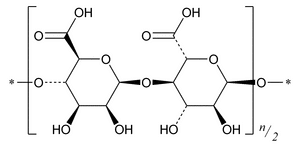Alginic Acid
(al jin' ik as' id).
DEFINITION
Alginic Acid is a hydrophilic colloidal carbohydrate extracted with dilute alkali from various species of brown seaweeds (Phaeophyceae).
IDENTIFICATION
• A.
Analysis:
To 5 mL of a 1-in-150 solution in 0.1 N sodium hydroxide add 1 mL of calcium chloride TS.
Acceptance criteria:
A voluminous, gelatinous precipitate is formed.
• B.
Analysis:
To 5 mL of a 1-in-150 solution in 0.1 N sodium hydroxide add 1 mL of 4 N sulfuric acid.
Acceptance criteria:
A heavy, gelatinous precipitate is formed.
• C.
Analysis:
To 5 mg in a test tube add 5 mL of water, 1 mL of a freshly prepared 1-in-100 solution of 1,3-naphthalenediol in alcohol, and 5 mL of hydrochloric acid. Heat the mixture to boiling, boil gently for 3 min, then cool to 15 . Transfer the contents of the test tube to a 30-mL separator with the aid of 5 mL of water, and extract with 15 mL of isopropyl ether.
. Transfer the contents of the test tube to a 30-mL separator with the aid of 5 mL of water, and extract with 15 mL of isopropyl ether.
Acceptance criteria:
The isopropyl ether extract exhibits a deeper purplish hue than that from a blank, similarly prepared.
IMPURITIES
• Arsenic, Method II  211
211 :
NMT 3 ppm
:
NMT 3 ppm
• Lead  251
251
Standard solution:
5 mL of Diluted Standard Lead Solution
Test preparation:
Add 1.0 g to 20 mL of nitric acid in a 250-mL conical flask, mix, and heat carefully until the Alginic Acid is dissolved. Continue heating until the volume is reduced to 7 mL. Cool rapidly to room temperature, transfer to a 100-mL volumetric flask, and dilute with water to volume.
Analysis:
Use 50.0 mL of the Test preparation, and proceed as directed in the chapter, using 15 mL of ammonium citrate solution, 3 mL of potassium cyanide solution, and 0.5 mL of hydroxylamine hydrochloride solution. After the first dithizone extraction, wash the combined chloroform layers with 5 mL of water, discarding the water layer and continuing in the usual manner by extracting with 20 mL of 0.2 N nitric acid.
Acceptance criteria:
NMT 5 µg of lead (corresponding to NMT 10 ppm)
• Heavy Metals, Method II  231
231
Analysis:
Use a platinum crucible for the ignition, and use nitric acid in place of sulfuric acid to wet the test specimen.
Acceptance criteria:
NMT 40 ppm
SPECIFIC TESTS
• Microbial Enumeration Tests  61
61 and Tests for Specified Microorganisms
and Tests for Specified Microorganisms  62
62 :
The total aerobic microbial count does not exceed 2 × 102 cfu/g, and the tests for Salmonella species and Escherichia coli are negative.
:
The total aerobic microbial count does not exceed 2 × 102 cfu/g, and the tests for Salmonella species and Escherichia coli are negative.
• pH  791
791 :
1.5–3.5, in a 3-in-100 dispersion in water
:
1.5–3.5, in a 3-in-100 dispersion in water
• Loss on Drying  731
731 :
Dry a sample at 105
:
Dry a sample at 105 for 4 h: it loses NMT 15.0% of its weight.
for 4 h: it loses NMT 15.0% of its weight.
• Articles of Botanical Origin, Total Ash  561
561
Sample:
4 g of Alginic Acid
Analysis:
Proceed as directed in the chapter, carefully igniting the Sample in a tared platinum dish, until the residue is thoroughly carbonized (5 min). Then ignite in a muffle furnace at a temperature of 800 ± 25 until the carbon is completely burned off (20–35 min).
until the carbon is completely burned off (20–35 min).
Acceptance criteria:
NMT 4.0% of ash
• Fats and Fixed Oils, Acid Value  401
401
Sample:
1 g of Alginic Acid
Analysis:
Suspend the Sample in a mixture of 50 mL of water and 30.0 mL of calcium acetate solution (11 in 250). Shake thoroughly, allow the mixture to stand for 1 h, and add phenolphthalein TS. Titrate the liberated acetic acid with 0.1 N sodium hydroxide VS. Perform a blank determination, and calculate the Acid Value:
Result = [(VS  VB) × N × F]/W
VB) × N × F]/W
| VS | = | = volume of 0.1 N sodium hydroxide VS consumed in the titration of the Sample (mL) |
| VB | = | = volume of 0.1 N sodium hydroxide VS consumed in the titration of the blank (mL) |
| N | = | = normality of sodium hydroxide VS (mEq/mL) |
| F | = | = equivalency factor of potassium hydroxide, 56.11 (mg/mEq) |
| W | = | = weight of Alginic Acid taken (g) |
Acceptance criteria:
NLT 230 on the dried basis
ADDITIONAL REQUIREMENTS
• Packaging and Storage:
Preserve in well-closed containers.
Auxiliary Information—
Please check for your question in the FAQs before contacting USP.
| Topic/Question | Contact | Expert Committee |
|---|---|---|
| Monograph | Robert H. Lafaver, M.S.
Scientific Liaison 1-301-816-8335 |
(EXC2010) Monographs - Excipients |
| Radhakrishna S Tirumalai, Ph.D.
Principal Scientific Liaison 1-301-816-8339 |
(GCM2010) General Chapters - Microbiology | |
| Radhakrishna S Tirumalai, Ph.D.
Principal Scientific Liaison 1-301-816-8339 |
(GCM2010) General Chapters - Microbiology |
USP35–NF30 Page 1690
